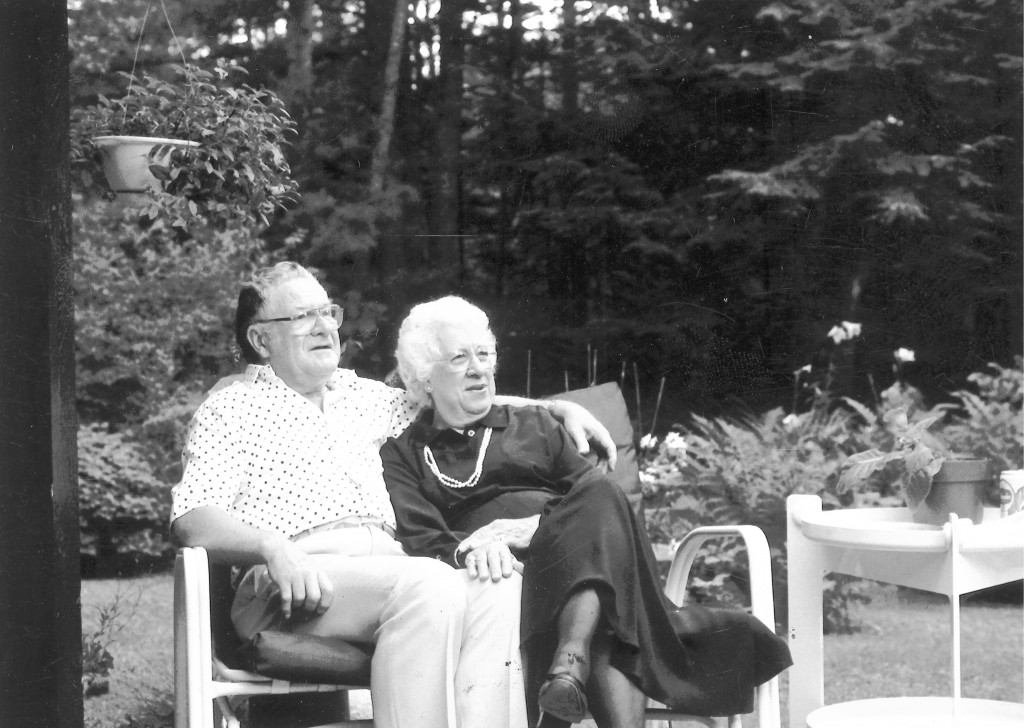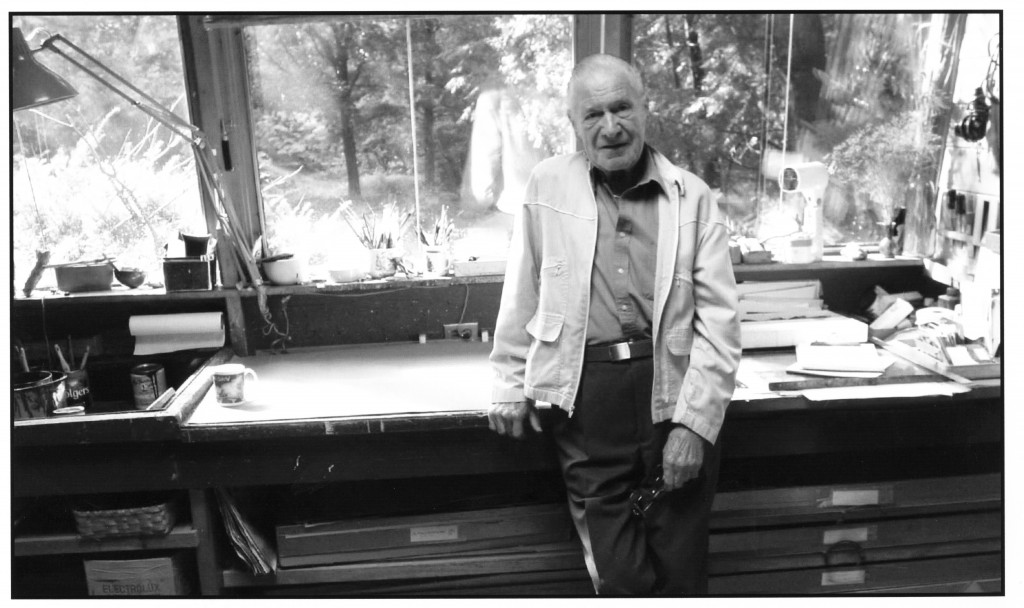Through art…we may be brought to live many lives and each may have so many fields of life to wander in as to never feel…empty. —D.H. Lawrence
Welcome to the website of artist, Vincent Hartgen. My name is Tiffany Paisley; Vincent Hartgen was my grandfather.
Vincent Hartgen’s influence not only touched his adopted state of Maine, but also reached out to a young girl, growing up far across the continent, in the high deserts of southern Idaho. Art was a daily experience while surrounded by my grandfather’s works, the many original prints my grandparents gifted to my family, and my parents’ own collections.
This was not the norm; in the 1980s, modern and original art was less common than today, especially in my small Idaho town. Bins of modern giclee prints did not fill the home sections of our town’s Kmart, HGTV was unheard of, and the Internet was not available for public consumption. A friend once commented, “Your house feels like a museum.” Other kids would look at my grandfather’s paintings in puzzlement and say, “I can’t tell what it is.” Until I visited the Maine coast, I was not exactly sure myself.
My first summer in Maine, we drove to the coast with my grandparents in their convertible, top down, taking in the salty air and the conversations of seagulls. My grandfather talked about his art lesson in which blindfolded students painted only what they could smell at the coast. All of Maine smelled different to me; it was moist and earthy, buzzing and full of life. A desert girl, a girl of spaces and emptiness, I longed to find something to fill the emptiness—that uncertainty all adolescent girls encounter, trying to discover who they are and who they want to be. Maine’s coasts and forests, my grandparents, and art changed that.
I fell in love with the new sights, sounds, smells surrounding me, and the novel ideas heard at kitchen table discussions. My sister, a toddler, played on the floor nearby while I sat with the adults, listening, observing, and questioning. My grandparents encouraged, engaged, and challenged my curiosity.
My grandfather spoke passionately and demonstratively about art, philosophy, literature, music, nature, food, and politics. Almost 25 years later, I still recall those discussions with my grandparents. Ever the consummate teachers, I learned more during my summers at that kitchen table, in the woods, and along the coast, than inside the walls of a classroom. Living in perfect balance—they relished the life of the mind, but also enjoyed the company of others and treated everyone they met with the same respect they afforded me at their kitchen table.
When I think of my grandfather, it is difficult to separate him from my grandmother. To me, they were both one: Frances and Vincent. Vincent and Frances. Grandma and Grandpa. “How can I explain, to show, how two personalities almost became one over the years?”[1] My grandmother wrote in her memoir.
Together, art was their life and their life was an art, a testament to their belief in the human spirit, in independence and individuality.
In August of 1989, I attended my first art exhibition— Founder and Futurist: Vincent A. Hartgen at 75. Their house was buzzing with friends and family as we prepared for the show. I still think back to that summer evening, all of us getting ready, waiting on the deck overlooking my grandfather’s canvas of Japanese flower gardens on the forest edge. If I close my eyes tight enough, I can feel mosquitoes buzzing at my ankles and hear the click of my father’s Nikon. I can still see my grandfather sitting in a deck chair, his signature kerchief in his jacket lapel. I can picture the brilliant daffodil-yellow house and jazz-blue studio angled to the side (a hue I have yet to find outside of nature). If I close my eyes tight enough, I smell deep forests of pine and cedar mixed with my grandfather’s cologne.
In 1994, Alicia Anstead of the Bangor Daily News perfectly captured the image that remains in my head and my heart. “When I get there (the house) with my portfolio of tiny paintings stuffed in a sandwich baggy, Hartgen and his wildly barking Springer spaniel, Patchess, greet me at the door. The dog stays behind, and Hartgen emerges—a small man with wavy gray hair, rose-colored glasses, and strong cologne. He hugs and kisses me.”[2]
Just before my grandfather died, I had the opportunity to visit him one last time. He quietly led me into the same studio I knew as child, “I want you to have some sketches, Tiff, pick what you like.” I struggled to hold back the tears, knowing what we both knew but could not say aloud. He died November 27, 2002.
In April, 2006, my father Stephen, Uncle David, and my stepsister, Tara Beck, helped my grandmother publish her two-part memoir—A Maine Passage. The first half, Close Like Yesterday, she wrote in 1977. As a young girl, I often read and reread this story, finding myself “between the lines,” as Grandmother wrote. She penned the second part, For Vincent, A Love Story, a year after he died. Seven months after its printing, on November 11, 2006 she passed away. She was 93.
In 2008, my father, uncle, and stepsister completed another book, a biography, art monograph, and catalogue raisonné—Vincent Andrew Hartgen: His Art and Legacy. Carl Little compiled extensive research and wrote the main essays, illustrating Hartgen’s relevance today, “Vincent Hartgen enjoys a place in the history of Maine art that is quite unlike any individual before or after him. A formidable artist—a master in watercolor and pen and ink—he also created a major university art collection and taught several generations of students the history and appreciation of art. His all-embracing commitment to art—his fervent belief that it should be a part of every individual’s life—led him down many rewarding paths. His unfaltering conviction as to the benefits engendered through the universal enjoyment and appreciation of all art touched countless lives.”[3]
We will never know about all the lives he continues to touch, as art is now a staple in Maine and beyond. Actor Tavia Gilbert, an Idaho native has lived in Portland, Maine for eleven years. The active participant in Maine’s tight-knit arts community says, “Art is deeply embedded in the passions of this state. There is a defined, distinct, and undeniable state ownership and pride that has become a huge part of the fabric of who I am.”[4] The passions she describes mirror the passions my grandfather felt and the mission he accomplished. Today the University of Maine Museum of Art and the art department continue to flourish as do numerous museums and galleries throughout the state.
When my grandfather moved to Orono in 1946, as the director of a one-person art department, the Maine art scene looked very different. “These days, when there are galleries in every town, art teachers in every high school, and the universities are turning out art degrees by the hundreds, one forgets what it was like when artists in Maine led lives that were completely separate from the regular folks in town,” said sculptor Ken Greenleaf [5] in a Maine Sunday Telegram review. “I was trying to create a revolution here,” my grandfather once explained, “I wanted to teach and encourage people to enjoy art, particularly modern art.”[6]
My sister, Rachel Frances Hartgen, and I feel we must pick up the torch and carry his legacy into the modern world, for he once told a class, “Sooner or later you become a modern whether you like it or not.”[7] This website and its social networking components are initially part of my senior honors thesis at the University of Colorado at Denver. My sister and I plan to continue to maintain and enhance this website.
At my grandmother’s funeral, a former student remarked, “An era has ended.” However, to my family, an era has just begun as we build an online presence. My grandparents would be thrilled by today’s technology—the democratic ideal of providing access and information to everyone. My grandmother wrote that Vincent “preferred looking forward…he relished the challenges of the future.”[8] We will continue that movement forward and carry their shared legacy into the virtual world.
We are the stuff our grandmother’s dreams are made on. —D.H. Lawrence
Tiffany Rose Paisley
Colorado Springs, Colorado
April 21, 2012
[1] Frances Hartgen, A Maine Passage, p. 130.
[2] Alicia Anstead, “Simplifying the Statement, Learning About Painting with Hartgen at 80,” Bangor Daily News, May 19, 1994.
[3] Carl Little, et, al, Vincent Andrew Hartgen: His Art and His Legacy, p. 56.
[4] Tavia Gilbert interview, April 8, 2012.
[5] Ken Greenleaf, “Vincent Hartgen Lately: Still Flat, With Depth,” Maine Sunday Telegram, June 12, 1994.
[6] Kristen Andresen, “A Shared Vision: The Passion of the Late Vincent A. Hartgen, Art Lover, Teacher, Collector, Lives on in a New Bangor Exhibit,” Bangor Daily News, October 23, 2007.
[7] Carl Little, et. al., Vincent Andrew Hartgen: His Art and His Legacy, p. 23.
[8] Frances Hartgen, A Maine Passage, p. 134.






